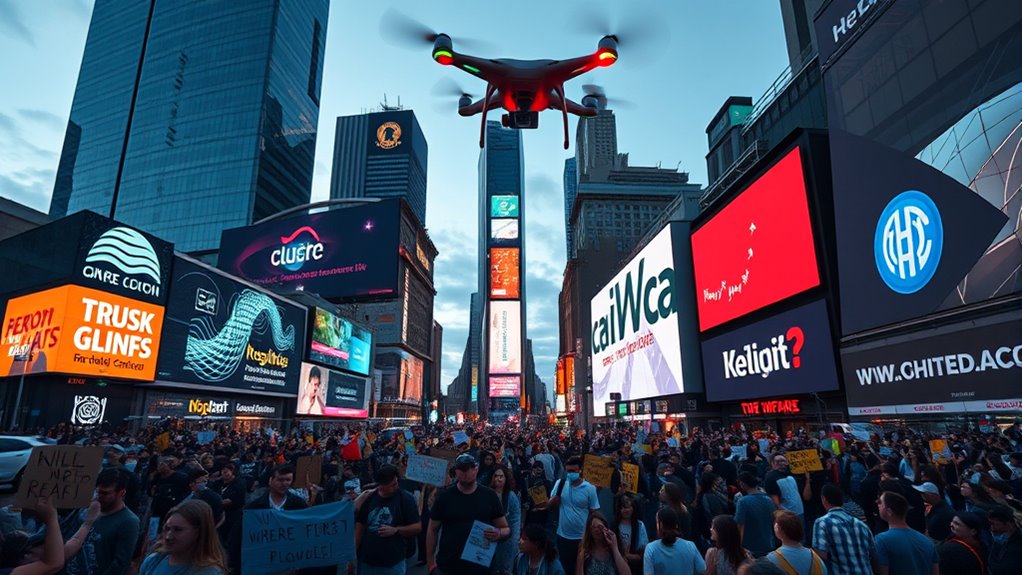In 2025, Big Tech faces intensified scrutiny as regulators aim to curb their market dominance and protect consumer rights. Governments are working to implement stricter antitrust laws, increase transparency, and limit monopolistic practices like consolidations and data misuse. This crackdown could reshape how these giants operate and influence your digital life. Staying informed about these ongoing efforts will help you understand what’s at stake and how future changes may impact your online experience.
Key Takeaways
- Antitrust investigations are leading to potential breakups or stricter regulations on major tech firms like Google, Amazon, and Facebook.
- Governments are implementing new laws to enhance transparency, data privacy, and limit monopolistic practices among Big Tech companies.
- Regulatory agencies are increasing oversight of mergers and acquisitions to prevent market consolidation and promote competition.
- Tech giants face ongoing scrutiny for data collection, privacy violations, and influence over public opinion and industry standards.
- Future regulation aims to balance innovation with consumer rights, shaping the digital landscape through tighter controls and accountability.

Have you ever wondered how much power Big Tech giants hold over our lives? It’s a question that’s more relevant than ever in 2025. These corporations have become integral to daily routines, influencing everything from the news we read to the products we buy. Yet, their market dominance raises serious concerns, especially around privacy and control. Their ability to shape markets often goes unchecked, leading to a handful of companies controlling vast swaths of digital space. This concentration of power means smaller competitors struggle to survive, stifling innovation and choice for consumers. As a result, governments and regulators are increasingly scrutinizing their practices, trying to curb monopolistic behaviors and promote fair competition.
Big Tech’s dominance threatens innovation, privacy, and consumer choice in 2025.
One of the main issues fueling the debate is privacy concerns. Big Tech companies gather enormous amounts of data from billions of users worldwide. This data fuels their advertising engines and allows them to tailor content and recommendations with unprecedented precision. While personalized experiences can be helpful, many users are unaware of the extent of data collection or how it’s used. Concerns about data security, misuse, and potential breaches have grown, especially when these companies hold so much sensitive information. Governments are now pushing for stricter data protection laws, demanding transparency about data collection and usage. They argue that users deserve more control over their personal information and that companies should be held accountable for mishandling data. Despite some regulatory efforts, the sheer scale and influence of these corporations make oversight difficult, and many fear that without tighter controls, privacy risks will continue to escalate.
Market dominance also plays a key role in shaping the landscape of the digital economy. Big Tech firms often acquire promising startups, effectively eliminating potential competitors and consolidating their power. This practice stifles innovation, as new entrants find it hard to gain traction against well-established giants. Furthermore, their dominance allows them to set industry standards, influence policy, and even sway public opinion through their platforms. Regulators are increasingly aware of how these companies leverage their market power to maintain their supremacy, sometimes at the expense of consumers and smaller businesses. Antitrust investigations are ongoing in multiple jurisdictions, aiming to break up or regulate these firms more stringently. The goal is to foster a competitive environment where innovation can flourish and consumers have real choices. Still, many argue that regulation needs to be smarter and more adaptive to keep pace with rapidly evolving technology and business models.
In the end, your digital life is deeply intertwined with these tech giants, and their growing power raises questions about the kind of internet future we want. As regulators step up efforts to rein in their market dominance and protect privacy, it’s essential for you to stay informed and advocate for policies that balance innovation with accountability. Big Tech’s influence isn’t going away, but how it’s managed in the coming years will determine whether your rights and choices are preserved or further eroded.
Frequently Asked Questions
How Have Antitrust Laws Evolved Since 2023?
Since 2023, antitrust laws have become stricter, targeting market consolidation more aggressively. You’ll notice regulators scrutinize big tech mergers, preventing monopolistic practices that stifle competition. These changes aim to foster innovation by encouraging smaller firms to compete fairly, which benefits consumers. As a result, the legal landscape now balances preventing excessive market power while still supporting technological progress, ensuring companies can grow without harming the overall market health.
What Specific Regulatory Measures Are Currently Targeting Big Tech?
You’re probably surprised, but these days, regulators are cracking down on Big Tech’s data privacy lapses and market monopolization. They’re enforcing stricter data privacy laws, demanding transparency, and breaking up monopolistic practices. Antitrust measures now include tighter scrutiny of mergers and acquisitions, targeted fines, and enhanced oversight. Ironically, while they claim to protect consumers, it feels like they’re just reshuffling the rules to keep Big Tech in check—yet the giants still hold most of the power.
How Are Consumers Affected by Increased Big Tech Regulation?
You’re likely to see both benefits and challenges from increased regulation. Your privacy concerns may be better addressed, with stricter rules protecting your data. However, it could also slow market innovation, potentially limiting new features or services. While regulations aim to create a fairer tech landscape, they might cause short-term disruptions or increased costs. Overall, your experience depends on how well these measures balance privacy safeguards with fostering innovation.
What Are the Global Differences in Big Tech Regulation?
You’ll notice that big tech regulation varies globally due to cross border policies and cultural considerations. In some countries, strict data privacy laws shape how companies operate, while others prioritize innovation and economic growth. Cultural values influence public expectations and government actions, leading to different approaches. You should stay informed about these differences, as they affect how tech giants expand, comply, and adapt across borders.
How Do Big Tech Companies Respond to Antitrust Investigations?
You might think big tech companies just roll over during antitrust investigations, but they fight fiercely to preserve their market dominance and safeguard consumer privacy. They often launch aggressive legal battles, lobby heavily to influence regulation, or spin their actions as protecting innovation. These strategies aim to stall or soften regulatory impacts, showing how they prioritize maintaining control while claiming to defend user rights, even amid scrutiny.
Conclusion
As you watch Big Tech face increasing scrutiny, it’s clear the landscape is shifting. Will these giants adapt or crumble under pressure? The push for tighter regulation aims to protect consumers and foster fair competition, but the question remains: can true innovation thrive amid this crackdown? Ultimately, your role as a user and observer shapes the future of technology—will you champion accountability or overlook the growing power of these corporations? The choice is yours.










